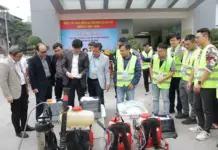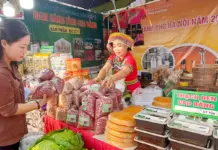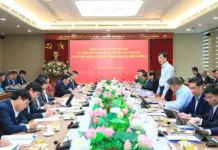Until the early 20th century, Ba Dinh Square was an abandoned ground. The French built a garden there called Round Square or Puginier flower garden named after a priest.
Some office buildings and villas were built surrounding the garden. One of the oldest buildings was the Governor’s Palace, built in 1902, which later was renamed the Presidential Palace.
The nearby Albert Sarraut school built in 1919 now becomes the Party Central Committee Office and the Department of Finance built in 1925 is now the Ministry of Foreign Affairs Headquarters.
The square was named “Ba Dinh” by doctor Tran Van Lai who was Hanoi Mayor in August 1945 to commemorate an uprising against the French colonialists in Ba Dinh stronghold of Thanh Hoa Province in the late 19th century.
In August, 1945, the August Revolution succecced, overturning the rule of colonialism and smashed the yoke of a thousand years of feudalism to establish the Democratic Ruplic of Vietnam. Ba Dinh square was chosen as a venue for the historical Independence Day ceremony.
Historian Duong Trung Quoc said, “President Ho Chi Minh chose Ba Dinh Square where he would read the Declaration of Independence in which he sent a message not only to Vietnamese nation but also to the changing world after facism was eliminated. President Ho Chi Minh affirmed that independence was seized by Vietnamese people themselves and this was an irreversible fact”.
Ba Dinh Square became a historical witness when on September 2, 1945, people took to the street with flags and flowers, eagerly waiting for President Ho Chi Minh to read the the Declaration of Independence and announce the birth to the Democratic Rupublic of Vietnam.
At 2 p.m on September 2, 1945, standing on a podium in Ba Dinh Square, President Ho Chi Minh read: “Vietnam has the right to freedom and independence and in fact is a country of freedom and independence. The entire Vietnamese people are determined to mobilise all their physical and mental strength, to sacrifice their lives and property in order to safeguard their freedom and independence”.
Historican Duong Trung Quoc said, “President Ho Chi Minh’s call was widely responded by the people. Ba Dinh Square witnessed a solemn moment on Sunday, September 2, when Vietnamese people commemorated their national independence”.
Ba Dinh Square is 320 meters long and 100 m wide. In the middle there is a flag pole which is 25 meters tall. It becomes a sacred land with nearby Ho Chi Minh Mausoleum, the Monument to the Fallen Soldiers and Thang Long Imperial Citadel. It is also a popular historical relic site to visitors.
Nguyen Thi Loan from Hoan Kiem district, Hanoi, said, “My family and I often visit Ba Dinh Square on Independence Day, September 2nd. It reminded me of the solemn moment when President Ho Chi Minh read the Declaration of Independence. I take my grandchildren here to make them know more about the glorious history of Vietnam”.




